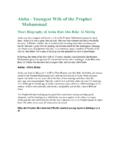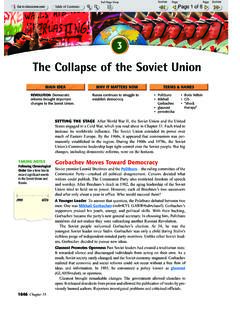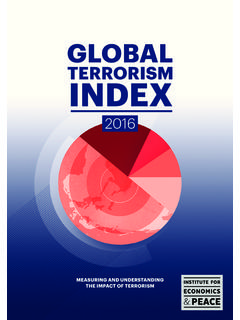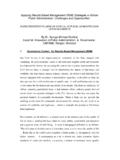Transcription of The Rise and Fall of Communism - USISLAM.ORG
1 The Rise and fall of Communismarchie brownToSusan and Alex, Douglas and Tamaraandto my grandchildrenIsobel and Martha,Nikolas and AlinaContentsA Note on Names Glossary and Abbreviations Introduction 1part one: Origins and Development1. The Idea of Communism 92. Communism and Socialism the Early Years 263. The Russian Revolutions and Civil War 404. Building Socialism : Russia and the Soviet Union, 1917 40 565. International Communism between the Two World Wars 786. What Do We Mean by a Communist System? 101part two: Communism Ascendant7. The Appeals of Communism 1178. Communism and the Second World War 1359. The Communist Takeovers in Europe Indigenous Paths 14810. The Communist Takeovers in Europe Soviet Impositions 16111.
2 The Communists Take Power in China 17912. Post-War Stalinism and the Break with Yugoslavia 194 Mapsviiviiix part three:Surviving without Stalin13. Khrushchev and the Twentieth Party Congress 22714. Zig-zags on the Road to Communism 24415. Revisionism and Revolution in Eastern Europe 26716. Cuba: A Caribbean Communist State 29317. China: From the Hundred Flowers to Cultural Revolution 31318. Communism in Asia and Africa 33219. The Prague Spring 36820. The Era of Stagnation : The Soviet Union under Brezhnev 398part four: Pluralizing Pressures21. The Challenge from Poland: John Paul II, Lech Wa esa, and the Rise of Solidarity 42122. Reform in China: Deng Xiaoping and After 43823. The Challenge of the West 459part five:Interpreting the fall of Communism24.
3 Gorbachev, Perestroika, and the Attempt to Reform Communism , 1985 87 48125. The Dismantling of Soviet Communism , 1988 89 50326. The End of Communism in Europe 52227. The Break-up of the Soviet State 54928. Why Did Communism Last so Long? 57429. What Caused the Collapse of Communism ? 58730. What s Left of Communism ? 603 Acknowledgements 619 Notes and Sources 623 Index 690 About the AuthorOther Books by Archie BrownCreditsCoverCopyrightAbout the PublisherMapsA Note on NamesThere is no completely consistent way of rendering people s names in a book such as this. In languages with a different alphabet from that used in English, there is more than one transliteration system for example, from Russian and from Chinese.
4 In the Russian case, I have used a simplified version of the standard British system, adopted also by a number of North American jour-nals. That means, for example, Trotsky, rather than Trotskiy (or the Library of Congress variant, which would be Trotskii). I have also favoured familiarity in the use of names. Thus, Trotsky s first name in Russia was Lev, but he is better known in the outside world as Leon, and that is the form I adopt. I do not use the Russian soft sign in the text. What in strict transliteration would be Zinov ev I render, as is more usual in English, Zinoviev. But when citing books or articles (and their authors) in Russian in the endnotes, as distinct from the main body of the book, I do aim to transliterate precisely. When a Russian author has published a book or article in English, I use the spelling of his or her name adopted by that the case of Chinese names, I have generally used the pinyin system, adopted by most China scholars now to take the obvious example, Mao Zedong rather than Mao Tse-tung.
5 But here again I have made conces-sions to familiarity. Since Chiang Kai-shek was dead long before the old Wade-Giles system was abandoned by China specialists, his name appears in that familiar form. For similar reasons I have used Kuomintang, rather than Guomindang. (The former and older rendering of the name of the movement established by Sun Yat-sen in 1919 is still used in Taiwan.)Names which are written in the English alphabet, but with the addition of diacritical marks, such as, for example, the Slovak Alexander Dubc ek, or the Hungarian J nos K d r, are used in precisely that way in the book. There are, however, people who have become better known in the anglicized version of their names especially monarchs such as Tsar Nicholas II of Russia or King Paul of Yugoslavia and those are the forms I have used.
6 Similarly, there are some Russians with the first name Aleksandr, such as Solzhenitsyn and Yakovlev, whose first name is usually rendered in English as Alexander, and for the sake of familiarity I have followed that practice. Stalin s first name is the equivalent of the English-language Joseph. Again, there is no one correct use. Stalin was a Georgian, and a strict transliteration of his name from Georgian would be Ioseb. In Russian it became Iosif. In English it is sometimes rendered as Josif, and that is the form I prefer making clear that it is the equivalent of Joseph, but not anglicizing it so naming of places can be no less problematical than what to call people. The capital city of Ukraine is correctly transliterated from Ukrainian as Kyiv, but in Russia it is called Kiev, and long ago that was the way in which it entered the English language.
7 I have not changed that familiar usage. To those who object, I would point out that Russians are quite relaxed about the fact that we call their capital city Moscow, not Moskva (which it is in Russian). Similarly, we call the Czech capital Prague, rather than Praha which it is in the Czech Republic. And the English, who have been at odds with the French over many matters and many centuries, do not hold it against their near neighbours that they call the English (and British) capital Londres. During most of the Soviet period the pre-revolutionary Russian capital of St Petersburg, renamed Petrograd from 1914 to 1924, was called Leningrad, and it is now St Petersburg (though not the capital) once again. I usually refer to it by its name at the time in bigger issue is raised by my use of Eastern Europe.
8 Some of the countries which were designated as being in Eastern Europe a term in common use, especially after they became Communist states were located in central Europe. Thus, Eastern Europe, as distinct from eastern Europe, is more of a political than a geographical designation. That is why I use a capital letter in Eastern . Given that this was a political description, the term became ambiguous and misleading from the moment Communist regimes collapsed in Europe. Its meaning was, however, clear enough under Communism , and it is with that period I am concerned in this volume. The Communist era comes up to the present day in several countries, but none of them are located in parties in Eastern Europe had different names at different times, such as the Polish United Workers Party (PUWP).
9 While sometimes using their official designation, I also use the generic term of Communist party when writing about them, employing a lower-case p when that was not the official title. The capital C is used for Communist states and parties. Lower-case Communism refers to the stateless society of the future which was supposedly to be the ultimate stage of social cited are listed in the endnotes. The first name as well as surname of an author is given on his or her first mention in the notes to each chapter. Other bibliographical details of a book, article, or archival document are also provided in full on their first mention in the chapter endnotes and abbreviated in the remainder of that chapter. the rise and fall of communismixGlossary and AbbreviationsAgitprop Agitation and PropagandaANC African National Congressapparat apparatus, bureaucracyapparatchik bureaucrat, full-time official (especially of Communist Party)BBC British Broadcasting CorporationBCP Bulgarian Communist Partyblat pull, influence through reciprocal favours (Russia)BSP Bulgarian Socialist PartyBund Jewish socialist organizationCC Central CommitteeCCP Chinese Communist PartyCheka All-Russian Extraordinary Commission for Combating Counter-Revolution and Sabotage (December 1917 22)CIA Central Intelligence Agency (USA)Cominform Communist Information Bureau (1947 56)Comintern Communist International (1919 43)
10 CPGB Communist Party of Great BritainCPI Communist Party of IndiaCPI (M) Communist Party of India (Marxist)CPR Chinese People s RepublicCPRF Communist Party of the Russian FederationCPSA Communist Party of South AfricaCPSU Communist Party of Soviet UnionCPUSA Communist Party of the USACPV Communist Party of VietnamCPY Communist Party of Yugoslavia (to 1952)CSCE Conference on Security and Co-operation in EuropeCWIHB Cold War International History BulletinDPA Democratic Party of AlbaniaDRV Democratic Republic of VietnamFNLA National Front for the Liberation of AngolaFRG Federal Republic of GermanyGDP Gross Domestic ProductGDR German Democratic Republicglasnost openness, transparencyGlavlit state censorship (USSR)Gosplan State Planning Committee (USSR)guanxi connections, networking, reciprocal exchange of favours (China)ID International Department (CC of CPSU)ILO International Labour OrganizationIMEMO Institute of World Economy and International Relations (Moscow)INF Intermediate-range Nuclear ForcesIskra The Spark (newspaper and organization founded by Lenin)









